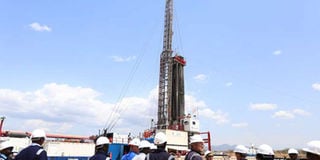We're likely to see US, UK stamping presence in 'petrodollar' dynamics

The Ngamia-3 oil exploration site in Nakukulas, Turkana South. PHOTO | BILLY MUTAI | NATION MEDIA GROUP
What you need to know:
Even though China and India are Nairobi’s critical strategic trade partners on the international stage, we are likely to see some key "partners", majorly the United States and United Kingdom, heavily stamping their presence as key protagonists in Turkana’s “petrodollar" dynamics owing to their age-old strategic relations with Nairobi.
The world’s “big boys” are keenly watching Nairobi as Kenya increasingly stumps its authority on the global economic map as one of the crude oil producers.
The announcement by Kenya that China and India would be the first two major buyers of the Turkana crude oil from June is bound to tilt heavily the geopolitical, trade and foreign policy alignments.
British explorer Tullow Oil, the developer of the Turkana oilfields, has already pumped out and stored close to 60,000 barrels of crude in Lokichar in readiness for transportation to Mombasa.
Even though the two countries are Nairobi’s critical strategic trade partners on the international stage, we are likely to see some key "partners", majorly the United States and United Kingdom, heavily stamping their presence as key protagonists in Turkana’s “petrodollar" dynamics owing to their age-old strategic relations with Nairobi.
Two of the critical and most commonly known phases are China’s role in Africa during the Cold War and, recently, the perception that China’s ventures in Africa are motivated mainly by its quest for energy security.
Experts opine that China’s entry into Africa is characterised by an "aid-for-oil strategy" that has resulted in increasing supplies of oil from African countries in return for comprehensive trade deals. This is what irks Washington.
'KEENLY WATCHING
The world’s “big boys” are keenly watching Nairobi as Kenya increasingly stumps its authority on the global economic map as one of the crude oil producers. The US and the UK have played key roles in helping Kenya combat al-Shabaab by pumping in billions of dollars.
Initially, it had been announced that buyers had been found in Europe, the home of Tullow Oil, but Kenya did not elaborate the sudden change of position.
It is an open narrative that the increasing imperial incursion of China, and India, into Africa is creating concern in Washington. The UK is also feeling the heat as its former colonies, including Kenya, aggressively and continuously court China and India.
China’s share of investments in Africa has grown rapidly since 2000, running into trillions of shillings, with Kenya being one of the key strategic players.
Since the end of the Cold War in the 1990s, amidst a deepening crisis in the Middle East and tightening petroleum markets, the US has increased its search for new sources of oil. This has led to renewed interest in the "African oil triangle", which is centred in the basin of the Gulf of Guinea.
UNIPOLAR SYSTEM
Since the global stage is currently a unipolar system, the US, in addition to pursuing its global war on terrorism, US security concerns in Africa revolve around the need to secure energy and other vital mineral resources.
Some of these resources include cobalt, coltan, diamond, gold, manganese, petroleum and uranium.
Pundits on the global arena claim that China’s current engagement with Kenya and Africa should be viewed within the context of globalisation in the aftermath of the Cold War.
Most economic aid given to African nations from China and India is actually not tied to "tough economic aid".
The fact is that these investments and development programmes have come in the form of development aid projects and loans strengthened through bilateral and multilateral forum such as the Asia-Africa Conference and the Forum on China-Africa Cooperation. Unlike the US, China has been expanding its interests to other sectors such as agriculture, electricity, banking and telecommunications.
Godfrey Olali is a communications expert with interest in foreign policy.




